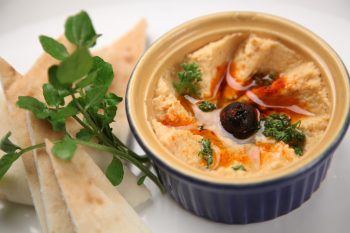Arab’s deep appreciation for food Posted by Hanan Ben Nafa on Apr 24, 2020 in Arabic Language, Culture, Vocabulary
As it’s the first day of Ramadan, I would like to start by sending my warm regards to all learners who celebrate it 🙂 Ramadan Mubarak رمضان مبارك
Since food is a popular topic موضوع شائع in this month, I decided to share with you some thoughts about the way food is perceived يُنظَر له in the Arab world العالم العربي and the rituals الطقوس around it. In this post, we are going to learn some of the common phrases and sentences that Arabs say or use when food is served, whether they were the ones serving it, i.e. the host المضيف or the ones to which food is served, i.e. the guest الضيف
If you are invited to eat at an Arab’s place, it’s worth familiarising yourself with what you will most likely to hear by your host. It’s also a good idea – as a guest – to know what to say on such an occasion and how to reply to your host’s greetings and wishes when food is around.
The phrases and sentences we’re going to learn are mainly related to the idea of health الصحة and this is because food is strongly viewed as a way to nourish يغذّي oneself and not just to fill one’s stomach.
-The two main words that tend to be used when someone wishes you well while you’re eating are:
SiHHa صحة
Which means “health”.
or:
ʕafiyah عافية
Which also means “health” or “good health”.
-There is another word that you may also hear a lot, although not as frequently as the previous two, is:
Salaamah سلامه
It generally means “safety” or “protection”.
*Popular phrases (by host) and replies (by guest):
١. صحة
SaHHA
This phrase is the most common and is found in very much all the Arabic dialects. The host would typically say it after the guest had started eating, and it basically means Bon Appétit or “May this bring health to you”.
To add some emphasis to the meaning, some say صحتين SaHte:n (two healths!).
>>A typical reply is: الله يسلمك Allh y-salm-i(a)k (May Allah protect you/ keep you safe).
٢. بالصحة والعافية
Bi-SiHHA wa al-ʕaafya
>>A typical reply would be: شكرًا Shukr-an (Thank you).
٣. بالهناء والشفاء
Bil-hanaa2 wa aš-šifaa2
This standard Arabic phrase literally means “with bliss and healing”. A modified version of it بالهنا والشفا bil-hana we eš-šifa is very popular in Egypt.
>>A typical reply would be: تسلم/تسلمي Tislam/Tislam-i (May you are protect/be safe).
٤. عليك بالعافية
ale:k bil-ʕaafyah
This phrase – literally means “health on you” – is what people in the Gulf region often use.
>A typical reply would be: الله يعافيك Allah y-ʕaafee-k (May Allah keep you healthy/ in good health).
*Popular phrases (by guest) and replies (by host):
١. يسلمو إيديكِ
y-islamu eede:-k-i
This phrase (in the Levantine dialect) means: (May your hands be protected).
>>A typical reply is: الله يسلمك Allh y-salm-ik (May Allah protect you/ keep you safe).
٢. الله يسلّم هالإيدين
Allah y-sallem hal-eede:n
This is a modified version of the previous phrase and it means (May Allah protect these hands).
The reply to the previous phrase can be used here. However, in the Libyan dialect, e.g. the reply is slightly longer>> الله يسلمك ويعطيك الصحة Allah y-salm-ik w y-aʕTee-k eS-SaHHa (May Allah protect you and give you health).
*Finally, if the guest looks overwhelmed or embarrassed by how much food he/she is served and repeatedly shows his/her gratitude, the host would usually say:
هادا واجبنا
Haada waajib-na
(This is our duty)
See you soon, in another blog post 🙂

Build vocabulary, practice pronunciation, and more with Transparent Language Online. Available anytime, anywhere, on any device.




